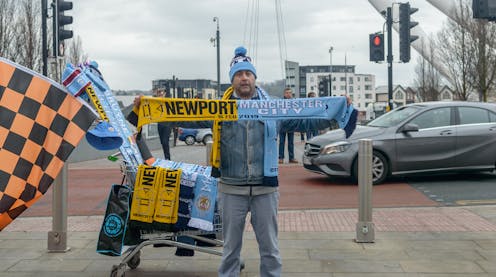Scrapping FA Cup replays has upset smaller clubs, but they could still win from being matched against the top sides
- Written by Mark Middling, Assistant Professor of Accounting, Northumbria University, Newcastle

Football fans delight in historic moments enjoyed by their club. Exeter City supporters for example, will have fond memories of the FA Cup third round match their team played on the wintry afternoon of January 8 2005.
Jubilant scenes greeted the final whistle after the side fought valiantly to secure a 0-0 draw[1], which gave Exeter City two things worth celebrating. First, as a non-league side in the fifth tier of English football, they had gone toe to toe with Alex Ferguson’s hugely successful Manchester United at Old Trafford. And second, they secured themselves a lucrative replay to decide which team would progress to the fourth round.
Manchester United won the replay 0-2 (and went on to reach the FA Cup final, which they lost to Arsenal). But the two matches earned Exeter City a significant windfall of £1 million[2] (closer to £2 million in today’s money) from ticket sales. This eliminated the club’s debt and set them on course to be a sustainable fan-owned club for the next 20 years and counting.
Exeter’s current chairman recently said[3] of the Manchester United fixture: “We would have been in a very different place today had it not been for that game.”
The tradition of FA Cup replays has become something of a cultural institution, adding to English football’s vital role in local communities[4]. The system, which means that for the first four rounds, matches ending in draws are replayed (rather than going to extra time and then penalties) has created cherished sporting moments[5] of individual brilliance[6], big club upsets[7] and memorable scorelines[8].
But they also provide an opportunity for smaller clubs to earn a big payday as gate revenues and TV incomes are split evenly[9] between the two competing teams. In the face of an increasingly risky financial environment[10] for football at all levels, this can be a lifeline to clubs, as it was for Exeter City in 2005.
So the FA’s decision[11] to eliminate cup replays from next season has caused some upset – mostly due to the possible knock-on effect for smaller clubs. The new rules seem designed to reduce the fixture congestion of the elite English clubs that play in European competitions[12].
Seeming to favour wealthy clubs in this way will only add to the continuing debate[13] about the commodification of football[14] versus longstanding cultural traditions[15].
Meanwhile, the Football Supporters Association[16] and campaign group Fair Game[17] (both of whom I have worked with previously on football accounting[18] and governance[19] matters), have called for replays to be reinstated[20] on the basis of heritage and tradition, as well as the economic value to smaller clubs.
Clubs including Tranmere Rovers, Stevenage and and Grimsby Town have also condemned the changes[21], claiming it will cause large disadvantages for smaller clubs, and arguing that[22] “the dreams of so many should not be denied by so few”.
However, the FA Cup has a history of change and evolution.
Before the 1990s, games which ended in a draw would be replayed as many times as necessary[23] until a winner was found (the 1980 FA Cup final between Liverpool and Arsenal took four games until Arsenal finally triumphed 1-0). Replays in all rounds have since been limited to one (with the second match going to extra time and penalties if necessary), and replays of the final were scrapped in 1998[24].
But replays are also not the only way for clubs to make money in the competition. This year non-league Maidstone United enjoyed a £700,000 windfall[25] after reaching the fifth round, and none of their games were replays.
Instead, it may be that smaller clubs being drawn against a much bigger club is the most important element. After all, back in 2005, Exeter City made more money from their first game at Old Trafford (with a vastly bigger stadium capacity) than they did from the replay on home turf.
And if the crucial element is the chance for lower league sides to compete with the goliaths of English football, a compromise could be reached. Football finance expert Kieran Maguire has suggested[26] a seeding system, similar to that used in tennis grand slams, whereby the top flight clubs can only be drawn against lower league unseeded teams in the early FA Cup rounds.
The lower league team would then get to choose whether the fixture was played at home (with perhaps a better chance of winning) or away (for a more lucrative fixture).
This compromise would reduce the congestion of games at the elite end of the game. But it would still give lower league clubs the chance to earn badly needed revenues – which for many would count as a big win, whatever the actual result.
References
- ^ secure a 0-0 draw (news.bbc.co.uk)
- ^ windfall of £1 million (www.mirror.co.uk)
- ^ said (www.bbc.co.uk)
- ^ local communities (www.jstor.org)
- ^ sporting moments (www.bbc.co.uk)
- ^ individual brilliance (www.bbc.co.uk)
- ^ big club upsets (www.theguardian.com)
- ^ memorable scorelines (www.skysports.com)
- ^ split evenly (talksport.com)
- ^ risky financial environment (www.emerald.com)
- ^ FA’s decision (www.thefa.com)
- ^ European competitions (www.bbc.co.uk)
- ^ continuing debate (juniperpublishers.com)
- ^ commodification of football (comunicacaoeesporte.files.wordpress.com)
- ^ cultural traditions (journals.sagepub.com)
- ^ Football Supporters Association (thefsa.org.uk)
- ^ Fair Game (www.fairgameuk.org)
- ^ football accounting (nrl.northumbria.ac.uk)
- ^ governance (www.fairgameuk.org)
- ^ be reinstated (www.bbc.co.uk)
- ^ condemned the changes (www.theguardian.com)
- ^ arguing that (gtfc.co.uk)
- ^ many times as necessary (www.thenationalnews.com)
- ^ scrapped in 1998 (www.independent.co.uk)
- ^ £700,000 windfall (www.bbc.co.uk)
- ^ has suggested (podcasts.apple.com)







